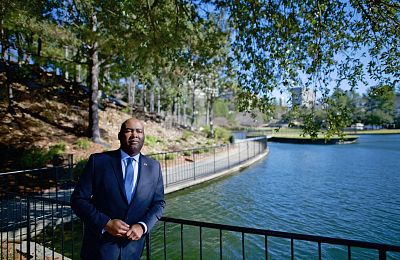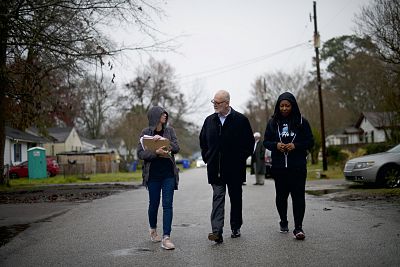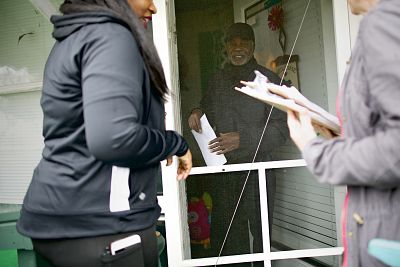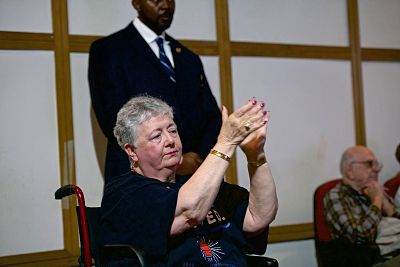"People are dying, and so many more are hurting. This has to be fixed," one woman said of the health care coverage gaps in South Carolina.
ORANGEBURG, S.C. — After years of hard work, Ashley Myers finally realized her dream of owning a women's fashion store and a beauty shop directly across the street from each other in this small, predominantly black city. But as the costs of her health care plan rose a year ago, she could only keep one storefront open.
Today, as the owner and the sole employee of the combined beauty shop and fashion store, she pays $800 a month for her insurance premiums, but she said it really only helps in dire circumstances. Otherwise, she pays so much out of pocket that she feels only as well off as her uninsured brother — he only sees a doctor in the emergency room, where he racks up huge medical bills.
"I try to be smart about when I go to the doctor and make sure I have the money or else they take it away from my business," Myers, 35, said.
For many in this city of 13,000, health care and insurance are foremost ahead of Saturday's Democratic primary, when South Carolina voters will likely weigh the medical plans proposed by the different presidential candidates. The most radical idea of "Medicare for All" is beginning to appeal to some like Myers, who are worried about their own pocketbooks or concerned for family and friends who don't have insurance.
"I just went to the doctor yesterday for a checkup and had to pay $100 just to be seen, and I still have to pay for the labs," Myers said from behind the store's counter, saying that she plans to vote for Sen. Bernie Sanders, I-Vt., on Saturday because he supports Medicare for All. "When I go in, it's always at least $350, and it's that much for my kids. At a certain point, it's like, 'Why am I paying for this?'"
Health care is deeply personal to many in South Carolina, which boasts the second highest medical debt rate in the country at 32.8 percent, according to a 2017 study by the Urban Institute. Further research by the public policy think tank found that the median for medical debt in collections for state residents is $787.
#embed-20200225-south-carolina-medical-debt iframe {width: 1px;min-width: 100%}
Jaime Harrison, the Democratic candidate who appears poised to give Sen. Lindsey Graham, R-S.C., the most difficult challenge of his Senate career, said that health care is the No. 1 issue for voters in the state. Graham introduced legislation to repeal and replace the Affordable Care Act and weaken the Medicaid program in 2017, and Harrison hopes to beat him by addressing the insurance coverage needs of his state.
It's an issue in South Carolina that stretches across the aisle, Harrison said.
"These are everyday people," Harrison explained. "They aren't Democrats and Republicans, they're not black or white — they're everybody. We have to figure this out. There is an important federal role in this process. We need to figure it out in a way that is not partisan."
Much of the state's health care woes can be traced back to that political wrangling.
The uninsured rate decreased sharplyin the state after the passage of the ACA in 2010. Once as high as 20 percent in 2008, the number dropped to 11 percent in 2016.
But then the Trump administration ended subsidy payments for the program, weakened the individual mandate, and reduced advertising funding and the enrollment period. By 2018, the uninsured rate crept up again to 13 percent.
That rate also didn't drop as far as it could have. South Carolina refused to expand Medicaid, which meant it did not receive $10.5 billion in federal funding that would provide health care coverage to nearly 250,000 low-income people. This has an outsize effect on communities of color, which make up more than a third of the state's population and whose uninsured rate is at 16 percent.
Along with 13 other states, South Carolina rejected Medicaid expansion because lawmakers felt it was fiscally irresponsible to pay for 10 percent of the program, which is required to receive the funding.
Democrats say that there is no road forward, however, to get those federal dollars. The conservative state Legislature and the Republican governor are both vehemently opposed to the program. South Carolinians also don't have the option of expressing their views on the issue via ballot initiative, like voters in Idaho, Utah and Nebraska, who all chose to expand Medicaid.
"If they're looking at it with any kind of objective common sense, they can't say it's working well," Democratic state Sen. Brad Hutto said of the state Republicans. "It's just ideologically this is a very conservative state. We're always the last to do it. The only thing we did first is fire the shots on Fort Sumter, otherwise we wait for everyone else."
That political reality has led some to argue that South Carolina's only hope to expand the public health care option is through the federal government. That means the 2020 presidential electioncould be the difference for a Democratic electorate in South Carolina that features more minorities and low-income people than its Republican counterpart.
That is what Wendell Potter, the former health care executive-turned Medicare for All advocate, argues. He and his advocacy group have spent some six figures in the state to try to educate voters on the landmark health care legislation that is driving the presidential campaigns of Sanders and Sen. Elizabeth Warren, D-Mass.
Potter's group has hired canvassers, bringing some in from out of state, to target five counties in South Carolina with large black populations to share more information about Medicare for All.
As the group has focused its sights on the black community, it seems apparent that Potter was also openly chipping away at the firewall of former Vice President Joe Biden, who has hitched his presidential prospects on the black community and South Carolina but remains opposed to Medicare for All.
Potter said that Biden had clung too closely to the ACA, thus overlooking the need for structural change in the health care industry.
"It did do a lot of good," Potter told NBC News of the ACA. "But it's built on a foundation that's not sustainable, and that is the foundation of profit-driven insurance companies really calling the shots in our health care system. As long as you have that in place, we're not going to be able to make progress in lowering cost of health care and getting people into health plans that are actually worth something."
The group plans to pursue similar campaigns in states after Super Tuesday, and intends to specifically target Wisconsin — a state that hasn't expanded Medicaid and is the host of the Democratic National Convention later this year.
But some Democrats said Potter and the candidates pushing for Medicare for All are politically naïve, especially in a state with a heavy conservative streak like South Carolina.
Joel Laurie, a former Democratic state senator who now works in the health care insurance industry, called Medicare for All a "pipe dream" that would only exhaust the political capital needed to help those people in South Carolina without health insurance.
Biden's plan, meanwhile, was an attractive option because Laurie said it could draw support beyond progressive Democrats and resolve South Carolina's health care issue at the federal level, circumventing the state government.
"Joe Biden's plan is the only one that takes a pragmatic approach to closing the gap," Laurie said. "He can't force Medicaid expansion, but he can create a federal Medicare option. That would be a huge win for people."
The other concern that has been reiterated by the Democratic establishment is that progressive policies like Medicare for All would hurt down-ballot candidates vying for elected offices in more conservative areas of the country, like South Carolina.
Harrison's challenge of Graham here often comes up in that conversation, as does Rep. Joe Cunningham who won a House seat representing the Charleston area and has been open about his opposition to Sanders and socialism.
Harrison, who has not endorsed any of the presidential candidates, took a practical stance.
"People retreat into camps, and I'm trying to bring people unified into one camp. We need health care for everybody, we need to make sure our health care isn't closed off to people, and we need to make sure these health care deserts aren't there," he said, adding that he was open to conversations on the best way to get there.
Still, for many South Carolinians, better health care coverage can't come soon enough.
Elizabeth Jones, 69, suffered a stroke without insurance and went bankrupt. While she waited for Warren and John Legend to take the stage at South Carolina State University on Wednesday, she said that even with Medicare coverage now, she often finds herself choosing between paying for her prescriptions and paying her electricity bill.
"People are dying here, and so many more are hurting" she said, adjusting herself in her wheelchair. "This has to be fixed."
















